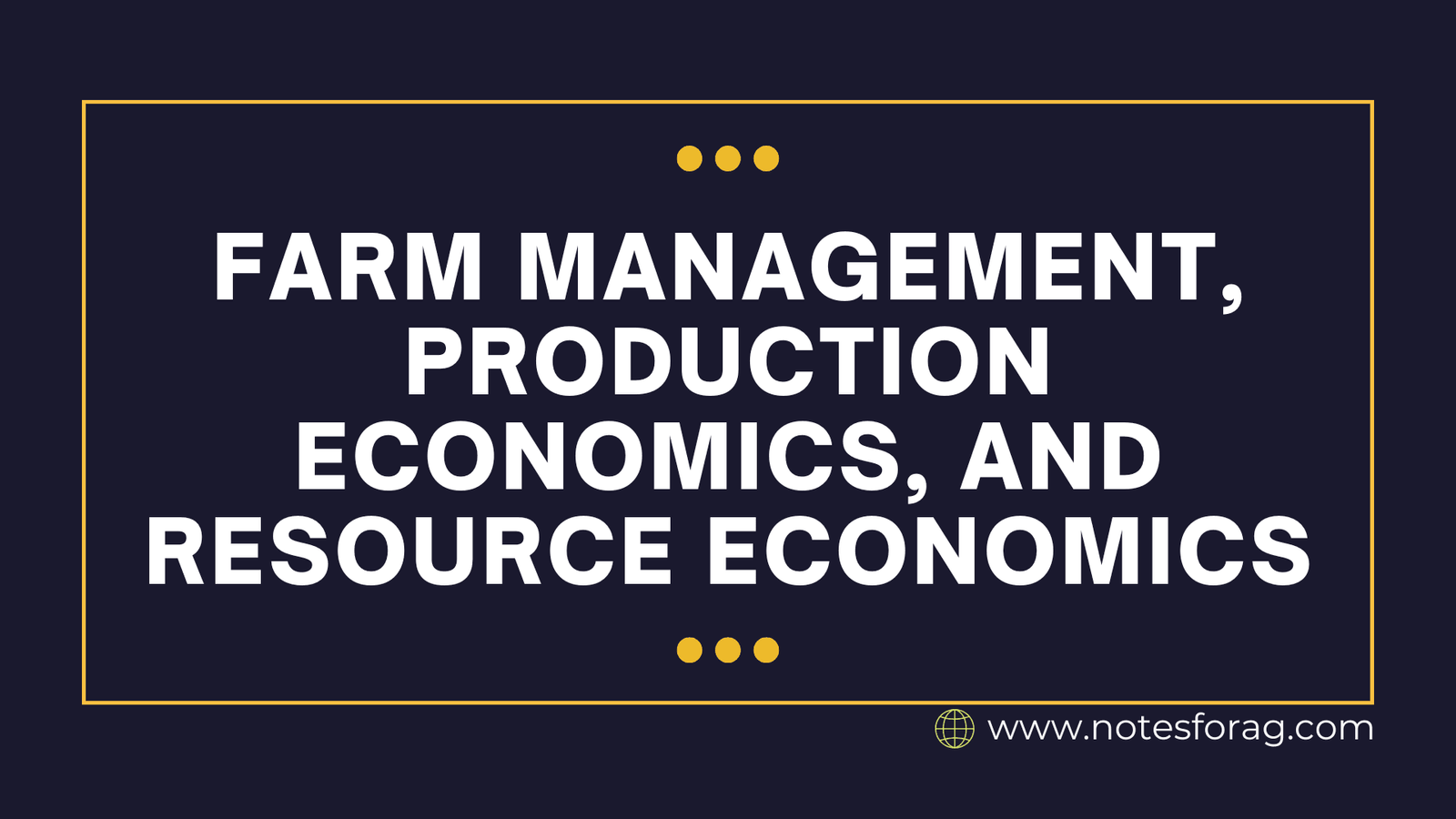Agriculture is critical in feeding the world, driving economies, and ensuring environmental sustainability. To achieve these objectives, the disciplines of Farm management, Production economics, and Resource economics focus on improving decision-making, optimizing production, and managing resources effectively.
Farm management emphasizes the practical application of management principles to ensure the efficient operation of farms. It involves planning, organizing, and controlling agricultural activities to achieve profitability and sustainability.
Production economics explores the relationship between inputs and outputs in agricultural systems, seeking to maximize efficiency and minimize costs. This branch focuses on optimizing resource use to achieve the highest possible returns.
Resource economics examines the sustainable use of natural and human-made resources in farming, including soil, water, and biodiversity. It addresses the balance between economic growth and environmental preservation, critical in the face of climate change and resource scarcity.
Together, these fields provide a comprehensive framework for enhancing agricultural productivity, ensuring sustainable resource use, and addressing the economic and environmental challenges of modern farming. This integrated approach is essential for meeting the growing global demand for food while safeguarding the planet for future generations.
Table of Contents
Objectives of Farm Management, Production Economics, and Resource Economics
The Objectives of Farm Management, Production Economics, and Resource Economics are:
- Optimize the use of resources to achieve the highest returns.
- Reduce operational costs while maintaining productivity.
- Equip farmers with tools and knowledge to make informed choices.
- Address risk and uncertainty in production, markets, and weather.
- Adopt modern farming techniques and technologies.
- Ensure efficient labor and machinery utilization.
- Balance economic goals with environmental conservation.
- Prepare farms to adapt to climate change and market volatility.
- Maintain accurate records to evaluate performance and improve operations.
Key Topics in Farm Management, Production Economics, and Resource Economics
The Key Topics in Farm Management, Production Economics, and Resource Economics are:
1. Farm Management
- Planning and Decision-Making
- Strategic, tactical, and operational planning in agriculture.
- Goal setting and prioritization for farms.
- Resource Allocation
- Effective use of land, labor, and capital.
- Balancing competing demands for limited resources.
- Enterprise Selection
- Factors influencing crop and livestock enterprise choice.
- Diversification and risk management.
- Record-Keeping and Budgeting
- Farm financial management (cash flow, income statements).
- Partial, enterprise, and whole-farm budgets.
- Risk Management
- Identifying, assessing, and mitigating risks (e.g., price fluctuations, weather).
- Insurance and hedging strategies.
- Adoption of Technology
- Role of precision agriculture, automation, and data analysis in farm management.
- Labor and Workforce Management
- Training, supervision, and efficient labor utilization.
2. Production Economics
- Production Functions
- Input-output relationships in agricultural production.
- Diminishing returns and stages of production.
- Cost Analysis
- Fixed and variable costs in farming operations.
- Break-even analysis and cost minimization strategies.
- Profit Maximization
- Identifying optimal input levels for maximum profit.
- Revenue generation strategies.
- Efficiency Analysis
- Technical, allocative, and economic efficiency.
- Use of tools like Data Envelopment Analysis (DEA).
- Economies of Scale
- Benefits and challenges of scaling up production.
- Impacts on cost structures and profitability.
- Market Dynamics
- Role of supply and demand in agricultural production.
- Impact of price fluctuations on production decisions.
- Innovation and Productivity Growth
- Impact of R&D and new technologies on agricultural productivity.
3. Resource Economics
- Natural Resource Management
- Soil and water conservation practices.
- Sustainable land-use planning.
- Environmental Economics
- Valuation of ecosystem services (pollination, carbon sequestration).
- Cost-benefit analysis of environmentally friendly practices.
- Energy Use in Agriculture
- Renewable energy in farming (solar, wind, biogas).
- Reducing energy inputs to improve sustainability.
- Climate Change and Agriculture
- Effects of climate change on agricultural systems.
- Mitigation and adaptation strategies.
- Economic Valuation of Resources
- Assessing the monetary value of land, water, and biodiversity.
- Use of market-based instruments like carbon credits.
- Agricultural Policies and Regulations
- Impact of government policies on resource allocation and sustainability.
- Role of subsidies, tariffs, and international trade agreements.
- Equity and Access
- Addressing disparities in resource access among farmers.
- Land tenure and ownership issues.
Importance of Farm Management, Production Economics, and Resource Economics
The Importance of Farm Management, Production Economics, and Resource Economics are:
- Effective management ensures optimal use of resources, reducing costs and increasing profits.
- Provides tools for strategic planning and improving decision-making.
- Identifies best practices for labor, machinery, and input usage.
- Balances enterprise diversity to maximize returns and mitigate risks.
- Equips farmers to adapt to changing market trends, policies, and climatic conditions.
- Encourages innovation through the adoption of technology and sustainable practices.
- Facilitates financial planning, loan procurement, and informed decision-making.
Conclusion
Farm management, production economics, and resource economics are integral to the development of sustainable and efficient agricultural systems. By focusing on optimizing resource use, maximizing productivity, and ensuring environmental stewardship, these disciplines empower farmers and stakeholders to address challenges such as food security, economic volatility, and climate change.
Together, they create a holistic framework that balances profitability, sustainability, and equity, enabling agriculture to thrive in a dynamic global landscape. Their application ensures not only the economic viability of farming enterprises but also the preservation of vital natural resources for future generations. In an era of growing global demands and environmental constraints, these fields remain indispensable for building resilient and sustainable agricultural systems.
Related Article
Geo-informatics and Nano-technology and Precision Farming
Sheep, goat, and poultry production

